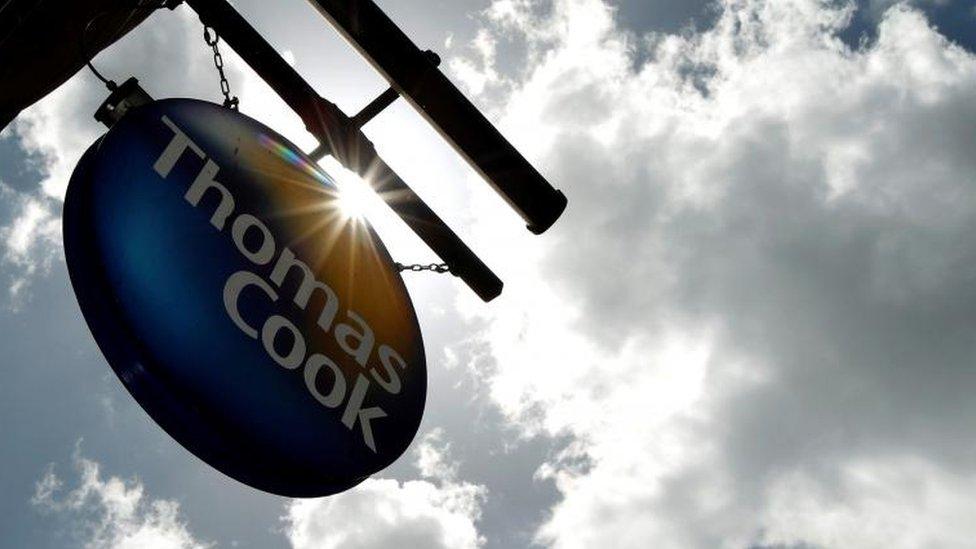'We get our money's worth with package holidays'
- Published

Colin and Kate Rawson on their recent honeymoon
Ryanair's chief executive Michael O'Leary recently declared package holidays "over" after the collapse of Thomas Cook. But travel experts say they are growing in popularity, particularly among younger travellers.
Kate and Colin Rawson, aged 30 and 40 respectively, recently opted for an all-inclusive cruise around the Mediterranean for their honeymoon. The couple from Warrington have done a number of all-inclusive holidays around Europe but this was their first cruise.
"Colin and I love eating and drinking whilst on holiday, so if we didn't do all-inclusive it would cost us a fortune. We always get our money's worth," said Mrs Rawson.
She says they're yet to be disappointed: "We do a lot of research - we like to look at reviews and whether everything is included."
'Lots of cash, little time'
The Rawsons are not alone. According to a recent report, external on the UK travel-industry, the popularity of all-inclusive holidays which typically include accommodation and meals as well as flights, is growing.
The research by management consultancy Deloitte found those aged from 16 to 44 were particularly keen on package deals.
Richard Slater, who runs a travel agency in Macclesfield, Cheshire, says the number of young people booking breaks with them has increased.
"There are still the gap year guys that go off and do their own thing, but with people going into jobs and apprenticeships, they've got a lot of cash to spend but not as much time.
"You'd think they'd go off and book it online but they actually just want to be able to say 'it's all booked, it's all fixed together'."

Kate Rawson likes an all-inclusive package deal as she knows her costs upfront
It's not just young people booking package breaks. Around half of UK holidaymakers, external take at least one overseas package holiday each year, according to travel trade organisation Abta.
Meanwhile, UK government statistics reveal a growth in the number of people taking package holidays from 15.9m in 2014 to 18.2m last year, external.
The most popular overseas destination for package holiday makers is Spain.
Abta says package holidays have changed significantly from the 1970s. It says there is a greater emphasis on personalisation, where holidaymakers can mix and match what they want to include instead of purchasing a pre-defined package.
'Dynamic packaging'
Figures from Market research firm Euromonitor support this. It says so called "dynamic packaging" has increased 40% over the past five years. This is where consumers canbuild their own package of flights, accommodation, and car rental instead of purchasing a pre-defined package.
It's this type of holiday purchase that appeals to Ada, a 51 year-old from Edinburgh, who typically books hotel and flight combinations with Expedia and lastminute.com.
"I usually check the website of the airline first and then I have a look at the hotel's website and see if I can get a better deal and usually I've found it saves me at least £100 or more for a holiday of about a week," she told the BBC.
Travelling with her husband, they've taken these kinds of trips to France, Belgium and Ireland - and have a forthcoming one to Sweden.
"They do have quite a range of hotels at a range of budgets - we always do mid-budget hotels and we never fly business class."
She says while it can be better financially, such deals can have drawbacks: "If there's a huge problem with the flights, these companies can't help you. They try to help with the hotels but if it's the airline's fault, you're on your own."
Despite this, she says this kind of package holiday beats the traditional alternative.
"I did a full package once many years ago and it just encourages you to eat even when you don't want it. It's like, 'I've paid a lot so I may as well'."
For Kate though, having everything included makes things easier: "Even when it's all-inclusive, we still go out for meals outside.
"We literally gave the travel agent a few details of what we were after and within a few hours he came back and had the whole thing sorted for us. All we had to do was pay."
- Published30 September 2019

- Published27 September 2019

- Published30 September 2019
